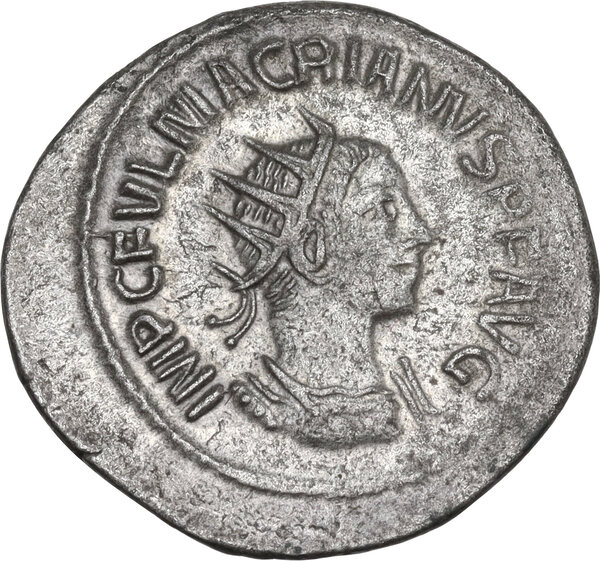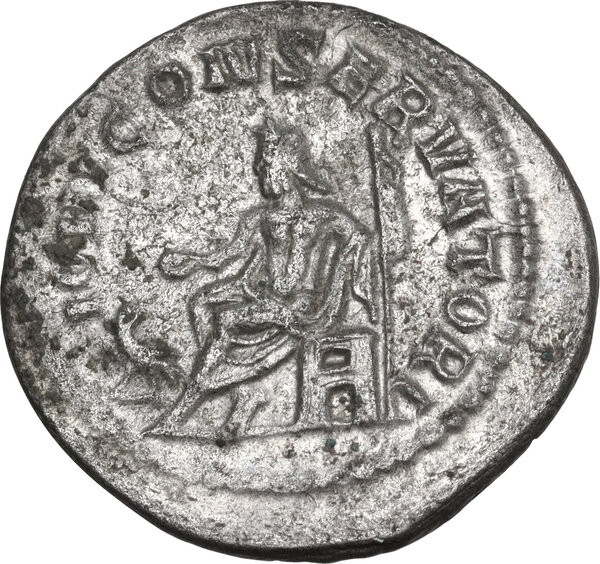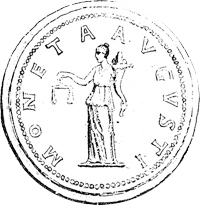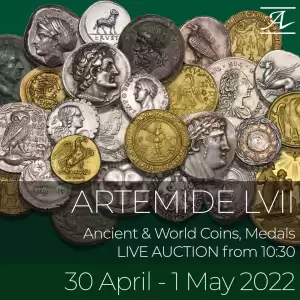

Macrianus, Usurper (260-261). BI Antoninianus, Samosata mint. Obv. IMP C FVL MACRIANVS PF AVG. Radiate, draped and cuirassed bust. Rev. IOVI CONSERVATORI. Jupiter seated left, holding patera and sceptre; eagle at feet, star to upper left. RIC V 9; C. 8 (Fr.30). 4.23 g. 22.50 mm. RR. Very rare. Excellent metal for issue and full flan. A brilliant example, lightly toned. Good VF/VF. When Valerian I was captured by the Sasanian king Shapur I in the spring or summer of 260 the Roman east was shattered. Not only had their emperor been subjected to the unthinkable, but Shapur followed up with an invasion of Syria, sacking Antioch more completely than it had been seven years earlier, when Uranius Antoninus revolted. Though Valerian’s son Gallienus was still the legitimate emperor, he was bogged down defending Europe from a host of calamities. In that sense we may see the uprising of Macrianus and Quietus as less of a revolt than a response to dire circumstances.
The eastern legions sparked a revolt at Antioch in September, turning to the praetorian prefect Callistus (nicknamed Ballista, meaning ‘catapult’) and the quartermaster-general Macrianus Senior for leadership. Though neither man assumed the purple himself, they proposed Macrianus’ two sons, Macrianus and Quietus, as emperor candidates. The revolt was well received throughout the Eastern provinces and Egypt, for Macrianus Senior controlled of Valerian’s treasury and Callistus had led the Roman legions to a follow-up victory over the Persians.
Gallienus entrusted his subordinates with the task of deposing Macrianus and Quietus some six months after their revolt had begun, which caused the rebels to divide their forces; Callistus and Quietus remained in the East while father and son Macrianus led an army westward, seemingly in hopes of overthrowing Gallienus. In the spring of 261 the Macriani were defeated in Illyricum by one of Gallienus’ commanders, Aureolus or Domitianus. In the East, Callistus and Quietus held out for eight months, spending their final days at Emesa, where the citizens murdered them when the city was besieged by Odaenathus, the king of Palmyra and Gallienus’ vice-regent in Asia Minor (NAC 34, 62).
The eastern legions sparked a revolt at Antioch in September, turning to the praetorian prefect Callistus (nicknamed Ballista, meaning ‘catapult’) and the quartermaster-general Macrianus Senior for leadership. Though neither man assumed the purple himself, they proposed Macrianus’ two sons, Macrianus and Quietus, as emperor candidates. The revolt was well received throughout the Eastern provinces and Egypt, for Macrianus Senior controlled of Valerian’s treasury and Callistus had led the Roman legions to a follow-up victory over the Persians.
Gallienus entrusted his subordinates with the task of deposing Macrianus and Quietus some six months after their revolt had begun, which caused the rebels to divide their forces; Callistus and Quietus remained in the East while father and son Macrianus led an army westward, seemingly in hopes of overthrowing Gallienus. In the spring of 261 the Macriani were defeated in Illyricum by one of Gallienus’ commanders, Aureolus or Domitianus. In the East, Callistus and Quietus held out for eight months, spending their final days at Emesa, where the citizens murdered them when the city was besieged by Odaenathus, the king of Palmyra and Gallienus’ vice-regent in Asia Minor (NAC 34, 62).


